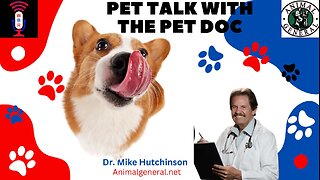Premium Only Content

How does VITAMIN K work..??? | Ward Dean MD
Vitamin K plays several crucial roles in maintaining health, primarily related to blood clotting and bone metabolism. Here's how it works:
Blood Clotting
Activation of Clotting Factors: Vitamin K is essential for the post-translational modification of certain proteins in the blood clotting cascade. These proteins include:
Prothrombin (Factor II)
Factors VII, IX, and X
Proteins C, S, and Z
Vitamin K acts as a cofactor for the enzyme gamma-glutamyl carboxylase, which adds carboxyl groups to specific glutamic acid residues in these proteins. This carboxylation is necessary for these proteins to bind calcium ions, which is critical for their functionality in the clotting process.
The Clotting Process:
When there's an injury, these vitamin K-dependent clotting factors are activated in a sequence that leads to the formation of a fibrin clot, which stops bleeding.
Without vitamin K, these clotting factors would not be properly activated, leading to prolonged bleeding times or severe bleeding disorders.
Bone Health
Bone Mineralization:
Vitamin K is involved in the carboxylation of osteocalcin, a protein made by osteoblasts (bone-forming cells). Carboxylated osteocalcin binds to hydroxyapatite, aiding in bone mineralization and strength.
It also influences the regulation of bone cells by affecting the balance between bone formation and resorption.
Potential Prevention of Osteoporosis:
Adequate vitamin K might reduce the risk of fractures by improving bone density and reducing the risk of osteoporosis, although more research is needed to confirm these benefits comprehensively.
Other Functions
Cardiovascular Health: There's emerging research suggesting vitamin K might play a role in vascular health by preventing the calcification of arteries through the activation of Matrix Gla Protein (MGP), which inhibits calcium deposition in the vascular system.
Cell Growth and Regulation: Some research indicates vitamin K might have roles in cell growth, possibly preventing cancer, although these effects are still under investigation.
Dietary Sources and Deficiency
Vitamin K is found in two natural forms: K1 (phylloquinone) from plant sources like leafy green vegetables, and K2 (menaquinone) from animal products and fermented foods.
Deficiency is rare but can occur in conditions like malabsorption disorders, long-term antibiotic use (which can kill gut bacteria that produce K2), or in newborns (leading to routine vitamin K injections at birth to prevent bleeding disorders).
In summary, vitamin K is vital for ensuring effective blood clotting, supporting bone health, and possibly other health benefits. Its deficiency can lead to significant health issues, emphasizing its importance in the diet or through supplementation when necessary.
-
 LIVE
LIVE
blackfox87
3 hours ago🟢 SUBATHON DAY 16 | Premium Creator | #DisabledVeteran
194 watching -
 1:10:13
1:10:13
Wendy Bell Radio
6 hours agoPet Talk With The Pet Doc
13.4K12 -
 1:11:37
1:11:37
Mike Rowe
8 days agoDoes China Control The NBA? | Enes Kanter Freedom #453 | The Way I Heard It
39.8K54 -
 LIVE
LIVE
TheItalianCEO
20 hours ago24-hr Arc Raiders Stream
95 watching -
 1:15:41
1:15:41
Steve-O's Wild Ride! Podcast
22 hours ago $2.83 earnedBert McCracken: The Unlikely Godfather of Hardcore Music
21.9K -
 LIVE
LIVE
Midnight In The Mountains™
3 hours agoGaming w/ Midnight | Arc Raiders w/ SilverFox & Sgt Wilky | 11AM EST
100 watching -
 LIVE
LIVE
dieseldesigns
4 hours agoServer SLAM Appetizer Before RELEASE! // Arc Raiders
54 watching -
 19:20
19:20
Stephen Gardner
1 day ago🚨Trump's latest Marco Rubio ORDER LEAKED by New York Times!
100K136 -
 21:33
21:33
Liberty Hangout
2 days agoDemocrats Invite Me Over For Breakfast
22.8K53 -
 2:38:56
2:38:56
FreshandFit
17 hours agoShe Left Her Man To Find A HVM In Miami w/ 6IX9INE
392K178